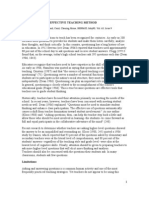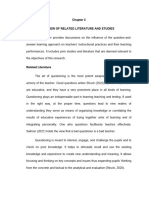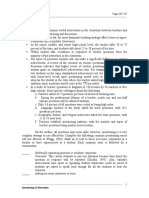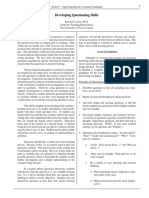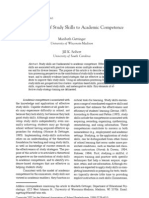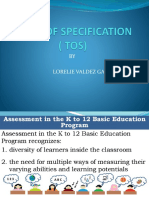Asking questions during a teaching and learning session is of great importance since questioning
develops critical thinking and increases learner engagement in a lesson. Questioning also
strengthens the learning process and makes the subject being taught a bit interesting and
enjoyable. In this assignment the writer is going to justify the relevance of asking questions
during the course of the lesson. Key terms to be defined are teaching and learning, teaching
practice and question.
Marais and Meier (2004) define teaching practice as a form of work integrated learning that is
described as a period of time when student teachers are working in the relevant industries to
receive specific service of training in order to apply theory into practice. This implies that during
teaching practice student teachers will be sent away to schools to spend their time interacting
with learning applying what they were taught back then when they were at college in a classroom
setup. Teaching practice can also be defined as the art and science of organizing knowledge and
demonstrating relevant skill (Bernstein, 2000) This means that during teaching practice student
teachers will be demonstrating theoretical skills acquired at the college before they were
deployed to the schools to interact with the real teaching environment. Therefore, teaching
practice can be defined as the period in which student teachers are deployed in schools and work
under college and qualified teachers' supervision in order to gain experience in real classroom
activities.
Brekelmans, Wubbels and den Brook (2002) assert that a question is a sentence worded or
expressed so as to elicit information. This means that a question is a statement that is directed to
someone who in turn have to respond. According to Clifton, Wubbels and Levy (2012) question
as a noun means something that is asked; interrogative sentence. This implies that for a statement
to become a question it should be interrogative and there must be a room for the next person to
1|Page
�answer. In other words, a question is an interrogative sentence directed to another person who in
turn should give a response.
Based on Socratic model questioning technique helps learners to think critically through focusing
explicitly on the process of thinking. According to Socrates, when questions are disciplined and
carefully structured then learners are able to slow down and examine their own thinking process.
According to Collier (2018), asking questions encourages independence and critical thinking.
This means that when a question is asked especially when everyone have a probability of being
asked to respond to the question then every learner is forced to go beyond what is surface and dig
down in order to answer the given question. This can be supported also by what I witnessed
during my teaching practice, when I asked my learners a question everyone would show some
seriousness in trying to think about the correct answer to the question. This helped almost every
learner to pay much attention knowing that he or she might be asked a question that wanted a
correct response in turn. Questioning increase learners' motivation and interest on the topic by
arousing curiosity especially if the facilitator uses learner centered questions.
However, using a learner's name for example Wayne, what does the word grazing mean gives the
rest of the class the ability to relax knowing that the question is already directed to someone. At
the end of the day only Wayne is forced to think critically in order to solve the problem
presented to him. Therefore, the teacher should add a learner's name after the question has been
posed, on or after the wait time. This makes everyone being fully engaged.
Questions accentuate learner engagement with the lesson being taught in the classroom. When
learners listen passively, they are not fully engaged with the lesson. That is when we end up seen
some learner sleeping or hibernating during the lesson because they have nothing that is
2|Page
�occupying them much other than listening. Teaching and learning process should be more like a
two-way communication process where everyone in the class have to contribute and learners
actively participate rather than spending half an hour listening. Collier (2018) says asking
questions is essential for checking learner understanding and keeping them engaged with the task
at hand. Cotton (2001) also says questions develop interest and motivate learners to become
actively involved in lesson. During my teaching practice, I witnessed that when I asked questions
or allow learners to ask questions during the lesson everyone will be paying attention as
compared to a lesson where the facilitator does all the talking and learners would end up sleeping
or making noise.
Conversely, some teachers ask questions that already contain the answer such as do we agree
water is a universal solvent or some low order questions that does not require one to be fully
engaged in order to answer them. This stops learners from generating their own response or
shouting some chorus answers for example a question like are we together class where everyone
shouts a "yes". Therefore, teachers need to objectively frame their questions without looking for
collective agreements and avoid implied response questions. Teachers must also use Bloom
taxonomy when framing their questions such that they do not end up asking only low order
questions.
Questioning strengthens the learning process. Children learn by asking questions. When this trait
is encouraged, it sets up good habits for learning in schools and beyond. When a teacher supports
questioning in the classroom, it fosters a stronger sense of participation. This breaks the
monotony of the classroom (Henderson, Fisher and Fraser, 2000). If learners are asking
questions, it means that they have been intently listening to the teacher and want more
information on the concept being taught. It also builds confidence since it takes a lot of courage
3|Page
�to ask a question in front of the entire class (Koopmans and Stamovlasis, 2016). During my
teaching practice when I allowed my learners to ask questions, they showed some sense of
involvement and those learners who gathered the courage to ask questions in the classroom
ended up joining the debate and public speaking club since they were confident enough to
express themselves. Cotton (2001) argues that allowing learners to ask questions stimulate them
to pursue knowledge on their own and ask their own questions.
On the contrary, learners together with the teacher may end up asking only lower-level questions.
They do not use all of the Bloom's Taxonomy. Learners may also end up asking questions that
have nothing to do with the concept being taught for example this other day during my teaching
practice a learner asked, "where does God come from?" Therefore, high level questions should
be used to fully equip learners for their daily lives and in preparation of their examinations.
A fruitful question and answer session in the classroom can instantly make the subject being
taught so much more interesting. When questions are asked, the boring topics also seem
interesting and the environment become more livelier and more interactive. Classes guided by
learners who are asking questions are much more interesting than those where the facilitator is
doing all the talking. Questions results in a more exciting and engaging environment where the
entire class is motivated and encouraged to participate in the discussion (Leary, 2020). Wragg
(2001) propounds that questioning arouse interest and curiosity concerning a topic being taught.
It makes learners want to continue learning the topic under discussion. It also removes all the
boredom of listening to the same voice all day long. I witnessed this during my teaching practice
when it was an oral lesson maybe on speaking and listening where learners where to ask one
another a question and the other one was to respond. Learners would spend the whole lesson
showing some interest unlike the one in which the facilitator would be doing all the talking and
4|Page
�demonstration. The process of asking questions helps learners understand the new topics, realize
others' ideas, evaluate their own progress and monitor learning processes. Learner-centered
teaching uses learners' interests and strengths to create a customized curriculum (Brekelmans and
Créton, 2003)
On the other hand, teachers often ask, "are we together class?" as a check for understanding or if
one is following what is being taught. In this case, learners may just shout a yes even if they are
not moving together with the facilitator. This also makes learners so reluctant and may not find a
reason to listen attentively since there will be no high order questions asked. Therefore, teachers
should follow Bloom’s Taxonomy when asking questions.
In conclusion asking questions is very crucial in a teaching and learning session since it makes
learners listen more attentively. Allowing learners to ask questions during the lesson motivates
learners and makes the lesson a bit interesting. It also builds confidence in learners. Teachers
must develop a habit of allowing everyone to participate during the lesson.
5|Page
�REFERENCES
Bernstein, B. (2000). Pedagogy, Symbolic Control and Identity (Revised edition): New York and
Oxford.
Brekelmans, M., and Créton, H. (2003). Interpersonal Teacher Behaviour Throughout the
Career. London: The Falmer Press.
Brekelmans, M., Wubbels, T., and den Brook, P. (2002). Teacher Experience and the Teacher–
Student Relationship in the Classroom Environment: An international perspective (pp.
73–100). Singapore: World Scientific Press.
Clifton M., Wubbels, T., and Levy, J. (2012). Student Performance, Attitudes, Instructional
Strategies and Teacher-Communication Style. London: The Falmer Press.
Cotton, K. (2001). Classroom Questioning. North West Regional Educational Laboratory.
Henderson, D., Fisher, D. L., and Fraser, B. J. (2000). Interpersonal Behaviour, Laboratory
Learning Environments, and Student Outcomes in Senior Biology Classes. Journal of
Research in Science Teaching.
Koopmans, M., and Stamovlasis, D. (2016). Introduction to Education as a Complex Dynamical
System. Cham: Springer.
Leary, T. (2020). An Interpersonal Diagnosis of Personality. New York: Ronald Press Company.
Marais, P and Meier, C., (2004). Hear Our Voices: Student Teacher’s Experience During
Practical Teaching. Africa Educational Review.
6|Page
